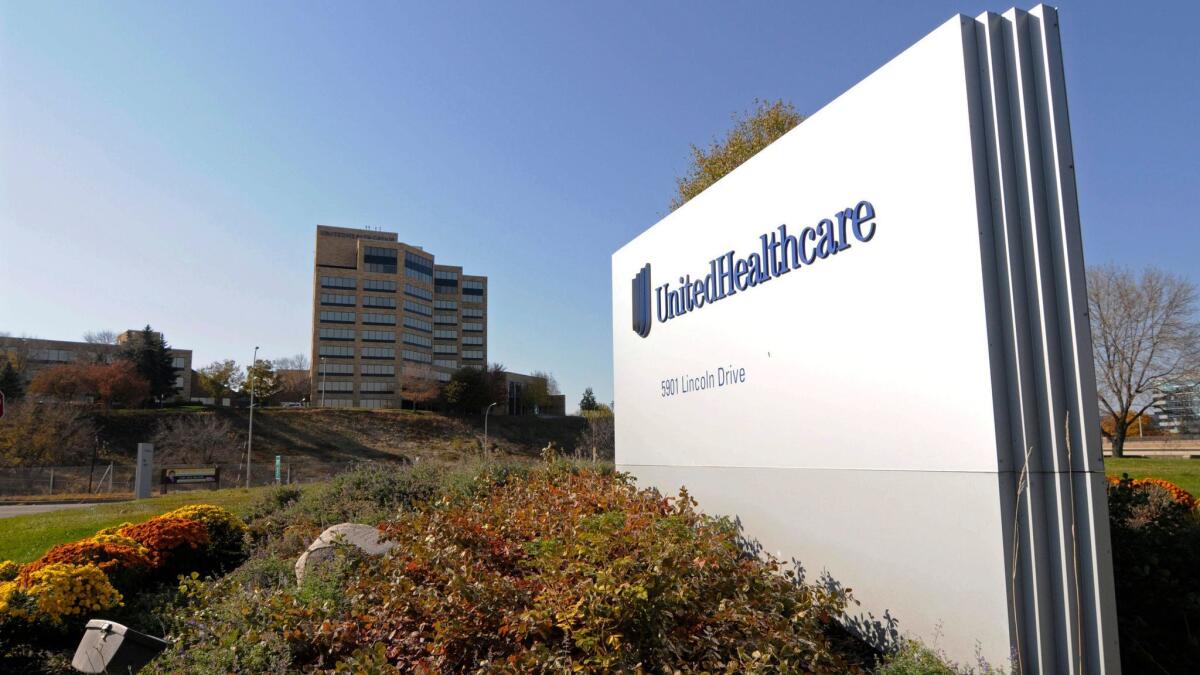Nation’s biggest health insurer wades into the ‘Medicare for all’ fight

- Share via
UnitedHealth Group Inc., the United States’ biggest health insurer, sharply criticized the “Medicare for all” proposals being debated by Democrats — wading into a heated political debate that’s likely to dominate the 2020 presidential race and the conversation about the future of private health plans in America.
For months, health insurers have kept mostly quiet about the proposal, whose most ambitious versions would replace privately financed health coverage with Medicare, the government program that covers about 60 million mostly elderly Americans. On Tuesday, UnitedHealth’s chief executive said such proposals would amount to a “wholesale disruption of American healthcare.”
As a source of coverage, UnitedHealth is almost as large as Medicare itself. It provides health insurance services to 49.7 million people, and last year it recorded revenue of $226.2 billion. Along with insurance, it operates physician practices, sells consulting and data services and administers drug benefits. It also covers millions of people in the private-sector versions of Medicare and Medicaid.
Despite its immense size, the Minnetonka, Minn., company has kept a relatively low profile with the wider public. Its quarterly earnings are typically buttoned-up events, treated as a financial indicator for other insurers who report later in the earnings season. Engaging in a political fight could turn it into a target as Democrats look for winning issues.
On Tuesday, UnitedHealth shares slid 4% to $220.96.
Other healthcare companies’ stocks declined as well. Health insurers including Anthem Inc., Humana Inc. and Cigna Corp. were down sharply. Shares of hospitals HCA Healthcare Inc. and Community Health Systems Inc. sank too.
Column: Bernie Sanders is wrong about getting private insurers out of the healthcare system »
Health insurance stocks have been rattled in the first few months of 2019 as Democratic presidential contenders have emerged to back variations of the Medicare-for-all idea. The sell-off has sent the Standard & Poor’s 500 Managed Care Index to its lowest level in nearly a year, and managed-care stocks are now trading at a 15% discount compared with the broader market, based on price-to-earnings ratios.
“The options are clear between a government-sponsored or government-run system and the one we have to offer,” UnitedHealth CEO Dave Wichmann said on a conference call with investors Tuesday. Wichmann said the costs of Medicare for all would “surely have a severe impact on the economy and jobs — all without fundamentally increasing access to care.”
Contenders for the Democratic presidential nomination, including Sen. Bernie Sanders of Vermont, have called for government-run healthcare as a way of covering more people, calling healthcare a “human right, not a privilege.”
Sanders discussed his plans at Fox News town hall in Bethlehem, Pa., on Monday night. Fox anchor Bret Baier asked the audience at the event to raise their hands if they had private health insurance from an employer.
“Now of those, how many are willing to transition to what the senator says, a government-run system?” Baier asked the crowd. There were cheers in the room as people raised their hands, and afterward Sanders posted a clip from the event, tweeting “raise your hand if you’re sick and tired of your private health insurance company.”
And last week, Sanders called out UnitedHealth, saying in a Friday tweet: “Your greed is going to end.”
Sanders specifically referenced Steve Nelson, who is CEO of UnitedHealthcare, the company’s insurance division. Sanders cited a Washington Post story about remarks Nelson made at a company meeting.
According to the Post, Nelson answered a question from an employee about the insurer’s role in the political discussion, saying: “The last thing you want to do is become the poster child during the presidential campaign.” A company spokesman said UnitedHealth had long supported the expansion of healthcare coverage.
UnitedHealth’s policy positions broadly align with moderate Democrats led by House Speaker Nancy Pelosi. The company has said it favors preserving the employer-based health insurance system and expanding coverage to uninsured people through public programs and financing.
There are many variations of the Medicare-for-all idea, but in general it involves expanding the program from older Americans to the rest of the population. Some proposals would have Medicare as an option for people to buy into and compete with private insurers. Others would replace the entire private health-insurance system with Medicare.
“The path forward is to achieve universal coverage, and it can be substantially reached through existing public and private platforms,” Wichmann said on the call, saying there should be a health system that “offers the access, choice and coverage protections people seek at a fair cost to the individual and society as a whole.”
More to Read
Inside the business of entertainment
The Wide Shot brings you news, analysis and insights on everything from streaming wars to production — and what it all means for the future.
You may occasionally receive promotional content from the Los Angeles Times.










